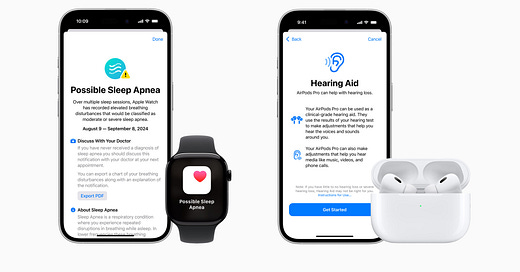C_NCENTRATE
Focused on the emerging side of things; technologies, territories, tools, strategies and ideas. Written by TBD Group (intelligence products, advisory, and events).
APPLE ROCKS HEARING AID MARKET IN UNDER 15 MINUTES
Despite OpenAI launching an intriguing new model (check out ‘What Did OpenAI Do This Week?’ for the full breakdown), the big news this week goes to Apple for AirPods Pro 2 being FDA-cleared hearing aids.
Apple’s announcement that the AirPods Pro 2 (see above) will soon serve as FDA-cleared hearing aids represents a significant milestone in both the tech and healthcare industries. This move underscores Apple’s broader strategy to penetrate the health market, valued at $15 trillion by 2030 (hearing aids alone raked in $12.96 billion in 2023). The approval places Apple in direct competition with traditional hearing aid manufacturers, offering an affordable and accessible alternative for people with mild to moderate hearing loss.
The most impactful aspect of this release is its potential to democratise access to hearing aids. Traditional hearing aids are often costly, with prices ranging from $799 to several thousand dollars. Apple’s AirPods Pro 2, priced at $249, make hearing aids more affordable and available to a broader audience. Moreover, over-the-counter (OTC) hearing aids—enabled by recent regulatory changes—do not require a prescription. Such a shift allows Apple to tap into the needs of the approximately 30 million Americans with hearing impairments who could benefit from such devices. A $9 billion market right there.
FDA approval for this use case validates the scientific foundation behind Apple’s technology. Apple’s hearing test, integrated into the iPhone, adapts the device’s sound output based on individual hearing profiles. The test has been rigorously evaluated in clinical studies, yielding results comparable to those of professional fittings.
Despite the promise, Apple’s AirPods Pro 2 as hearing aids come with limitations. The battery life is a crucial issue, offering only six hours of use, which pales in comparison to traditional hearing aids designed for all-day wear. Additionally, the device is only suitable for those with mild to moderate hearing loss. People with severe hearing impairment will still need professional audiological support and specialised devices.
Apple’s push into healthcare has not been without controversy. As seen with the pulse oximeter feature in the Apple Watch, some industry experts argue that consumer-grade tech may not always meet the standards of professional medical devices. Masimo’s CEO has accused Apple of “masquerading” as a medical provider with its products. Similar skepticism may arise in the hearing aid market, with traditional manufacturers potentially questioning the efficacy and reliability of Apple’s offering for all users.
Apple’s foray into the hearing aid market aligns with its ongoing efforts to innovate within the healthcare space, following similar moves with heart rate monitoring, ECG readings, and irregular heartbeat notifications. This strategy not only benefits individuals needing affordable medical devices but also serves Apple’s business model. Analysts believe that the inclusion of health-focused features in devices like the AirPods Pro 2 will help the company capture a more significant share of the wearable tech market, revitalising a product category that has seen declining sales in recent years.
Oh, before we go on…
TNN IS HAPPENING ON THURSDAY >
And it’s a big one…‘The Future of…OPENAI + BIG TECH’ with Bloomberg’s Parmy Olson, September 19th, 8am, London. It’s time to get real about OpenAI and pals.
A few places left - book your place here / TBD+ members go free, join here. We HIGHLY recommend you attend.
TBD Group offers you strategic advice, reviews, business development, pitch refinement, training and more. Drop us a line, get a fresh perspective.
SO WHAT?







